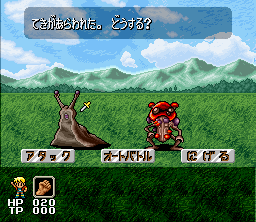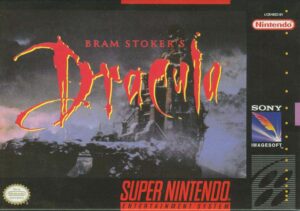Retro Replay Review
Gameplay
Dual Orb: Seireiju Densetsu delivers a classic JRPG experience rooted in turn-based combat and strategic party management. Battles are viewed from a first-person perspective, giving each encounter a sense of immediacy as you issue commands to Ralph and his companions. The control scheme is intuitive, with clear menu navigation for selecting attacks, magic spells drawn from the Orb’s dragon soul, and items. As the game progresses, you’ll unlock special abilities that can be chained together for devastating combo effects, rewarding careful planning and timing.
(HEY YOU!! We hope you enjoy! We try not to run ads. So basically, this is a very expensive hobby running this site. Please consider joining us for updates, forums, and more. Network w/ us to make some cash or friends while retro gaming, and you can win some free retro games for posting. Okay, carry on 👍)
Exploration in Dual Orb is both rewarding and nostalgic. The world map unfolds gradually, revealing hidden caves, ancient ruins, and charming villages populated by diverse NPCs. Side quests abound, offering rare equipment and lore tidbits about the ancient dragons’ legacy. The balance between main story progression and optional content is well-maintained, ensuring you never feel forced down a single path. Dungeons often feature light puzzle elements—lever switches, pressure plates, and secret corridors—that break up the standard battle-and-talk loop.
Progression feels meaningful thanks to a solid leveling system and equipment upgrades influenced by the Orb’s magic. Ralph gains access to more powerful dragon-infused skills as his bond with the Orb grows, while companions each have unique skill trees tied to their backgrounds—whether a fairy’s healing magic or a beastfolk’s brute force. This variety encourages experimentation with different party compositions, making each playthrough feel personalized. Difficulty ramps up at key story junctures, providing a satisfying challenge without ever feeling unfair.
One standout feature is the Orb Fusion mechanic. By interacting with ancient dragon shrines, you can temporarily merge Ralph’s abilities with those of a dragon ancestor, unlocking breath attacks, elemental shields, and more. These transformations are visually spectacular and turn the tide in tough battles. Learning when to trigger Orb Fusions becomes a tactical layer of its own, especially in boss fights that test your resource management and timing. Overall, the gameplay loop in Dual Orb strikes a fine balance between classic JRPG comfort and fresh strategic depth.
Graphics
Dual Orb embraces a charming retro aesthetic, blending pixel-art character sprites with richly detailed 2D backgrounds. Villages are cozy and inviting, with flickering lanterns, thatched roofs, and townsfolk going about their routines. Forests teem with life—sunlight filters through leafy canopies, while subtle animations (fluttering butterflies, rustling foliage) add a sense of immersion. Dungeons adopt a more somber palette, with stone corridors, torchlit altars, and runic inscriptions hinting at the world’s draconic past.
Character portraits during dialogue scenes are crisp and expressive, capturing emotional highs and lows as Ralph interacts with companions and spirit guardians. Bosses, particularly the draconic foes you encounter, are impressively drawn; their animation frames convey raw power, from coiling necks to wing beats. Spell effects are vibrant without being garish: healing spells bloom in gentle green light, while fire-based attacks explode with warm, flickering embers that linger onscreen just long enough to appreciate the artistry.
The UI design is clean and unobtrusive. Menus frame the screen with elegant borders inspired by draconic motifs, and icons for items, skills, and status ailments are instantly recognizable. During battles, health bars and magic points are displayed clearly alongside turn order indicators, ensuring you always know who acts next. The world map is stylized, featuring hand-drawn topography that highlights mountains, lakes, and key landmarks—a welcome touch that makes navigation feel more organic than a standard grid.
Overall, Dual Orb’s graphics strike a harmonious balance between nostalgic pixel charm and modern polish. It never feels like a mere throwback; instead, visual flourishes enhance the sense of a living, breathing parallel world torn from ancient legend. Whether you’re admiring a sunset over a village or confronting a silhouetted dragon in its lair, the game’s art direction consistently enchants.
Story
At the heart of Dual Orb lies a rich narrative of rediscovery and balance. Set in a parallel world where humans once lived in harmony with dragons, fairies, and animals, the game’s lore unfolds through conversations, journals, and environmental storytelling. The initial premise—humans’ fear-driven severance from dragons—sets a somber tone, hinting at the consequences of lost trust. This backdrop gives weight to Ralph’s journey as he strives to restore equilibrium between races.
The protagonist, Ralph, begins as a modest fighter apprentice on his graduation day. When the spirit of the universe’s creator-dragon presents him with the magic Orb, the stage is set for a classic hero’s quest. What elevates the story is the interplay between light-hearted village life and the looming threat of an evil spirit bent on annihilation. Companions Ralph meets along the way—each with their own motivations and personal stakes—add depth to the narrative, forging camaraderie that feels genuine. Their banter, occasional conflicts, and shared triumphs humanize what could have been a one-note mission.
World-building shines through optional lore hunts, wherein relic fragments and hidden inscriptions reveal the ancient dragons’ culture. These moments provide context for the Orb Fusion mechanic and make each shrine visit more than a gameplay convenience—it becomes a narrative milestone. Boss encounters often feature cutscenes that tie character arcs into the central conflict, ensuring you’re emotionally invested when stakes escalate. Plot twists, such as discovering unexpected allies or confronting the origin of the evil spirit, keep the story engaging from the first village festival to the final confrontation.
Dialogue is well-voiced by text and complemented by atmospheric music that underscores tension, wonder, and heartfelt resolve. Though written in a traditional JRPG style, the script avoids clichés by grounding characters’ aspirations in relatable themes—friendship, sacrifice, and the yearning for unity. By the time you face the story’s climax, you’ve not only witnessed a world reborn but also grown alongside Ralph as he fulfills his destiny as the Orb’s chosen champion.
Overall Experience
Dual Orb: Seireiju Densetsu is a testament to the enduring appeal of traditional JRPGs, enhanced by modern design sensibilities. From its strategic turn-based combat and Orb Fusion system to its lovingly crafted pixel-art world, the game strikes a delightful balance between nostalgia and innovation. You’ll find yourself lost in exploration, seeking out every hidden shrine and side quest, all while forging a deeper bond with your party members.
The pacing feels just right: moments of tranquil village life build character relationships, dungeons challenge your wits and reflexes, and narrative peaks evoke genuine emotional resonance. Whether you’re a veteran JRPG fan or new to the genre, Dual Orb’s approachable mechanics and gradual difficulty curve ensure an accessible yet rewarding journey. Its soundtrack—an evocative blend of sweeping orchestral themes and gentle folk melodies—further immerses you in the struggle to reunite a fractured world.
While the game pays homage to classics of the genre, it avoids feeling dated. Quality-of-life features like quick-save points, menu shortcuts, and adjustable battle speed streamline the experience without sacrificing challenge. Performance is rock-solid across platforms, with minimal load times and stable frame rates even during animation-rich boss fights.
Ultimately, Dual Orb: Seireiju Densetsu invites players into a beautifully realized parallel universe where ancient dragons’ wisdom and human courage intertwine. Its engaging gameplay, striking visuals, and heartfelt story combine to create an adventure that resonates long after the credits roll. For those seeking a JRPG that honors tradition while delivering fresh experiences, this title is a must-consider purchase.
 Retro Replay Retro Replay gaming reviews, news, emulation, geek stuff and more!
Retro Replay Retro Replay gaming reviews, news, emulation, geek stuff and more!









Reviews
There are no reviews yet.